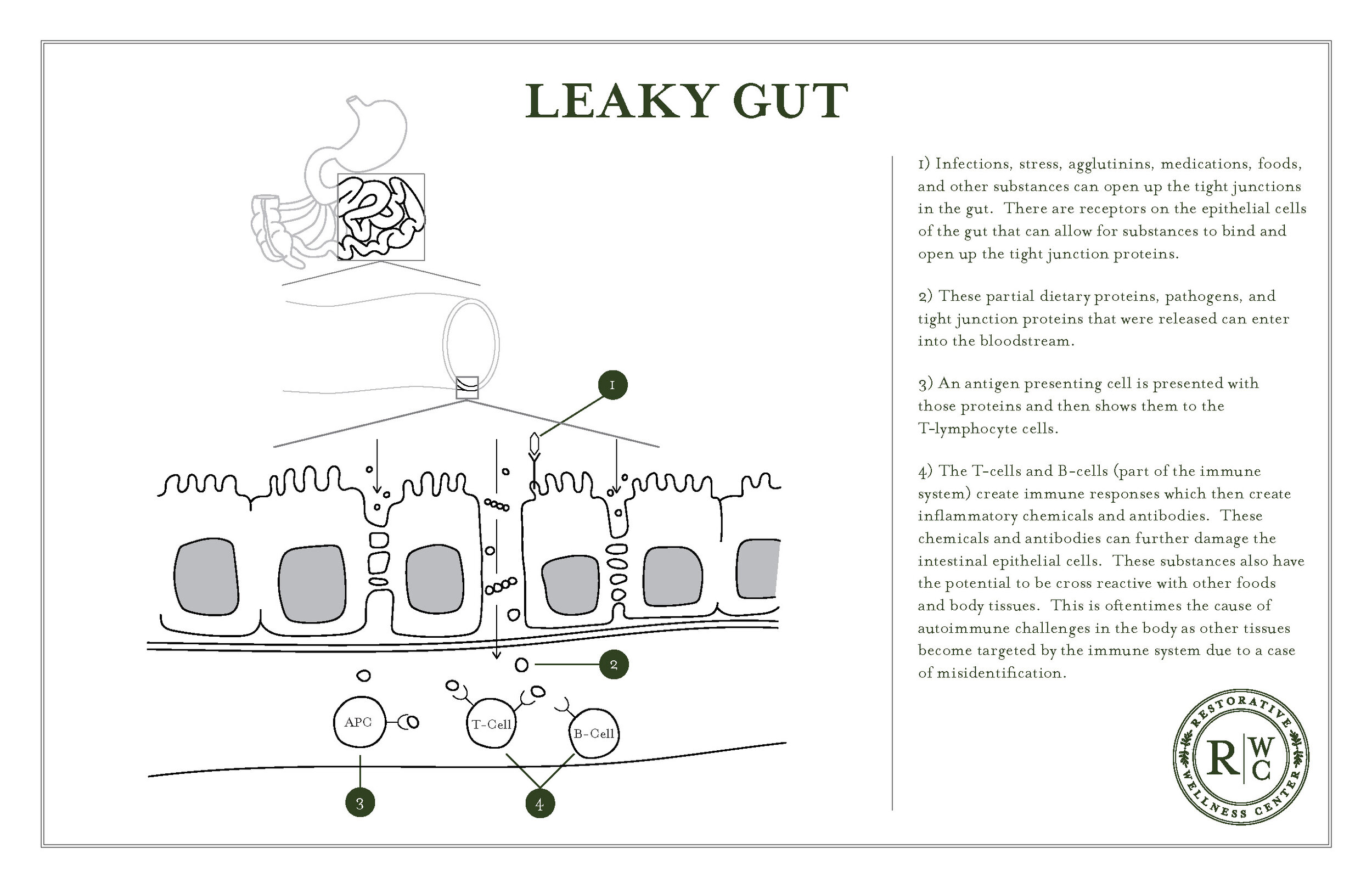The term “leaky gut” has become a trending topic in the healthcare arena over the past several years. Many health professionals are discussing leaky gut, and rightly so, because it has immense ramifications on overall health and well-being. Proper gut barrier function is crucial for human health and disease prevention.
Leaky gut, also known as intestinal hyperpermeability, is exactly what the name suggests. It is a syndrome that occurs when spaces form between the cells that line the gut; essentially causing them to become “leaky.”
Understanding the Gut
In order to understand leaky gut, it is important to have a deeper knowledge of the anatomy involved. The gut is basically a tube that runs from the mouth to the anus. It may seem strange, but the contents (ie. food, feces, etc.) within this hollow tube are actually still outside of the body! In order for anything to enter the body, it must pass through the gut barrier. The gut acts as a gatekeeper to the internal environment of the body. Some of its most important roles are to allow crucial nutrients from the food we eat into the body while simultaneously protecting from toxins, fungi, bacteria, parasites, or other “foreign invaders” from entering the body. In a healthy human, this process is highly regulated and effective. However, the health landscape of our culture today lends to a breakdown in gut barrier integrity.
Common Causes of Leaky Gut
While each individual is different in terms of genetic makeup and environmental exposures, research sheds light on many contributing aspects to leaky gut. Each of these factors alone can impact the integrity of the gut barrier. The more of these components you are exposed to, the greater risk there is for having a leaky gut. We will expand on these in future posts, but for now it it helpful too see the risk factors listed out.These include:
Stress
Emotional trauma
A diet high in sugars and processed foods, (the Standard American Diet)
Infections such as fungal overgrowth, parasitic infections, etc.
NSAIDs, birth control pills, and other medications
Food allergies/sensitivities
Traumatic brain injury (TBI)
Strenuous exercise
Heavy metals
Gut-brain axis dysregulation
Alcohol and other substance abuse
Celiac disease
Symptoms of Leaky Gut
It has long been theorized that disease begins in the gut. While there can be many symptoms that have roots in intestinal hyper permeability, some common symptoms that point to a leaky gut include:
GI issues including gas, bloating, reflux, constipation, diarrhea, or IBS
Food allergies and food sensitivities
Brain symptoms including brain fog, difficulty concentrating, ADD or ADHD
Mood related symptoms including anxiety and depression
Seasonal allergies or asthma
Skin symptoms including eczema, psoriasis, rosacea, or acne
Hormone imbalances such as irregular periods, PMS, or PCOS
A diagnosed autoimmune condition such as Lupus, Rheumatoid Arthritis, Hashimoto’s thyroiditis, Celiac disease, etc.
Chronic fatigue syndrome or fibromyalgia
Nutrient deficiencies including magnesium, zinc, b vitamins, etc.
The Autoimmune & Chronic Disease Connection
Astonishingly, the lining of the gut is just one cell layer thick! A single layer of enterocyte cells are all that protects the body from the outside world (external environment) Keep in mind, the contents of the gut are still considered to be on the outside of the body.
Just beyond this single layer of cells in the Gut Assocaited Lympoid Tissue (GALT). This is where 80% of the body's immune system is housed. As the spaces between the enterocyte cells become bigger, larger particles (proteins, antigens) are able to pass through the gut barrier. They are able to make their way into the body. These proteins make their way into the bloodstream and the body tags them as a foreign invader by creating antibodies. The immune system becomes overreactive to these proteins as the T cells and B cells begin to create antibodies and inflammatory chemicals.
The body’s own tissues are made up of proteins. Overtime in an individual with a leaky gut, the body starts “seeing” its own tissues as a foreign invader because of constant exposure to foreign invaders due to leaky gut. The tissues of the body have similar molecular sequences as the foreign invaders that are entering the body through the gut. These molecule (protein) sequences essentially mirror each other. In functional medicine, this is known as molecular mimicry.
Testing for Leaky Gut
There are a few functional lab testing options for those concerned about whether or not they have leaky gut. These methods are relatively non-invasive, including stool testing, blood testing, and/or urine testing. At our clinic we choose the best test based on our patient’s health history. After a 60-90 minute consultation, our doctors can discuss the best testing options for leaky gut. From there, they will review the results and come up with a plan to restore gut function using diet, supplementation, and lifestyle factors. Thankfully, there are many helpful tools in helping the body regain gut function and wellness in this area! Please reach out to our clinic and let us know if we can be a resource for you.
Sources
https://www.ncbi.nlm.nih.gov/pubmed/22109896
https://www.ncbi.nlm.nih.gov/pubmed/22731712
https://www.ncbi.nlm.nih.gov/pubmed/8738870
https://www.ncbi.nlm.nih.gov/pubmed/31076401
https://www.ncbi.nlm.nih.gov/pmc/articles/PMC4432792/
https://www.nature.com/articles/srep35405
https://www.ncbi.nlm.nih.gov/pubmed/26919969
https://www.ncbi.nlm.nih.gov/pmc/articles/PMC6013262/
https://www.ncbi.nlm.nih.gov/pubmed/28950279



